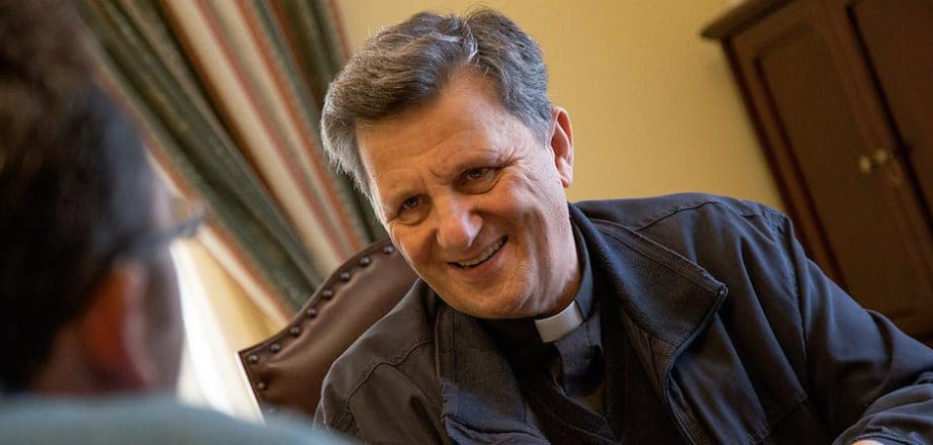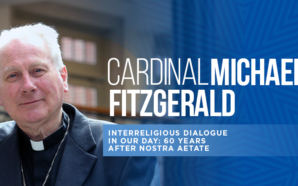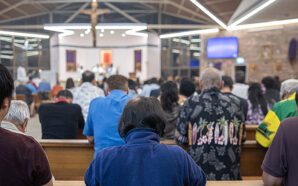Bishop Mario Grech is the new secretary general of the Synod of Bishops. Born in Malta in 1957, he was appointed Bishop of Gozo in 2005 by Benedict XVI. From 2013 to 2016 he was president of the Episcopal Conference of Malta. On October 2, 2019, Pope Francis appointed him pro-secretary general of the Synod of Bishops. In this capacity he participated in the Synod on the Amazon. Bishop Grech’s pastoral experience is extensive. His friendliness and ability to listen to questions prompted us to have a free-running conversation.
Starting with the condition of the Church in the time of the pandemic – ecclesiology under lockdown – and the related important challenges for today, we naturally moved on to reflections on the sacraments, evangelization, the meaning of human fraternity, and therefore of synodality, which Bishop Grech sees as closely connected. A section of the interview was dedicated to the “small domestic Church,” hence the conversation was conducted jointly by a priest and a layman, who is a husband and father.
Bishop Grech, the time of the pandemic that we are still going through has forced the world to stop. The home has become a place of refuge from the contagion; the streets have emptied. The Church has been affected by this climate of suspended activity and public liturgical celebrations were not allowed. What were your thoughts as a bishop, as a pastor?
If we take this as an opportunity, it can become a moment of renewal. The pandemic has brought to light a certain religious ignorance, a spiritual poverty. Some have insisted on freedom of worship or freedom to worship, but little has been said about freedom in the way we worship. We have forgotten the richness and variety of experiences that help us to contemplate the face of Christ. Some have even said that the life of the Church has been interrupted! And this is truly incredible. In the situation that prevented the celebration of the sacraments, we did not realize that there were other ways in which to experience God.
In the Gospel according to John, Jesus says to the Samaritan woman: “The hour is coming when you will worship the Father neither on this mountain nor in Jerusalem. […] the hour is coming, and is now here, when the true worshipers will worship the Father in spirit and truth, for the Father seeks such as these to worship him” (John 4:21-23). The disciple’s fidelity to Jesus cannot be compromised by the temporary lack of the liturgy and the sacraments. The fact that many priests and laity went into crisis because suddenly we found ourselves in the situation of not being able to celebrate the Eucharist coram populo is in itself very significant.
During the pandemic, a certain clericalism emerged, even via social media. We witnessed a degree of exhibitionism and pietism that has more to do with magic than an expression of mature faith.
So what is the challenge for today?
When the temple in Jerusalem where Jesus prayed was destroyed, the Jews and Gentiles, not having the temple, gathered around the family table and offered sacrifices with their lips and prayers of praise. When they could no longer follow the tradition, both Jews and Christians took up the Law and the Prophets and reinterpreted them in a new way.[1] This is the challenge for today as well.
When he wrote about the reform that the Church needs, Yves Congar affirmed that the updating desired by the Council must go as far as the invention of a way of being, of speaking and of committing oneself that responds to the need for total evangelical service to the world. Instead, many pastoral initiatives in this period have been centered around the figure of the presbyter alone. The Church, in this sense, appears too clerical, and the ministry is controlled by clerics. Even the laity are often conditioned by a pattern of strong clericalism.
The lockdown we have lived through forces us to open our eyes to the reality that we are experiencing in our churches. We need to reflect, to question ourselves about the richness of lay ministries in the Church, to understand if and how they have expressed themselves. What good is the profession of faith if this same faith does not become the leaven that transforms the dough of life?
What aspects of Church life have emerged from the shadows in this time?
We have discovered a new ecclesiology, perhaps even a new theology, and a new ministry. This therefore indicates that it is time to make the necessary choices to build on this new model of ministry. It will be suicide if, after the pandemic, we return to the same pastoral models that we have practiced until now. We spend enormous energy trying to convert secular society, but it is more important to convert ourselves to achieve the pastoral conversion of which Pope Francis often speaks.
I find it curious that many people have complained about not being able to receive communion and celebrate funerals in church, but not as many have worried about how to reconcile with God and neighbor, how to listen to and celebrate the Word of God and how to live out a life of service.
With regard to the Word, then, we must hope that this crisis, whose effects will accompany us for a long time, may be an opportune moment for us, as Church, to bring the Gospel back to the center of our life and ministry. Many are still “Gospel illiterate.”
In this regard, you mentioned earlier the question of spiritual poverty: what is its nature, and what are the most obvious causes of this poverty, in your opinion?
It is undeniable that the Eucharist is the source and summit of Christian life or, as others prefer to say, the summit and source of the very life of the Church and of the faithful[2]; and it is equally true that “the liturgical celebration […] is the sacred action par excellence, and no other action of the Church equals its effectiveness to the same degree”[3]; but the Eucharist is not the only possibility that the Christian has to experience the mystery and to meet the Lord Jesus. Paul VI observed this well when he wrote that in the Eucharist “the presence of Christ is ‘real’ not by exclusion, as if the others were not ‘real.’”[4]
Therefore, it is of concern that someone feels lost outside of the Eucharistic or worship context, for it shows an ignorance of other ways of engaging with the mystery. This not only indicates that there is a certain spiritual illiteracy, but is proof of the inadequacy of current pastoral practice. It is very likely that in the recent past our pastoral activity has sought to lead to the sacraments and not to lead – through the sacraments – to Christian life.
Spiritual poverty and the absence of a true encounter with the Gospel have many implications…
Certainly. And one cannot really meet Jesus without committing oneself to His Word. Concerning service, here’s a thought: Didn’t those doctors and nurses who risked their lives to stay close to the sick transform the hospital wards into other “cathedrals”? Service to others in their daily work, plagued by the demands of the health emergency was for Christians an effective way of expressing their faith, of reflecting a Church present in today’s world, and no longer a “sacristy Church,” withdrawn from the streets, or content to project the sacristy into the street.
So, can this service be a way of evangelization?
The breaking of the Eucharistic bread and the Word cannot happen without breaking bread with those who do not have any. This is diakonia. The poor are theologically the face of Christ. Without the poor, one loses contact with reality. So, just as a place for prayer in the parish is necessary, the presence of the soup kitchen in the broad sense of the word is important. Diakonia or the service of evangelization where there are social needs is a constitutive dimension of being Church, of its mission.
Just as the Church is missionary by nature, so from this missionary nature flows charity for our neighbor, compassion, which is capable of understanding, assisting and promoting others. The best way to experience Christian love is the ministry of service. Many people are attracted to the Church not because they have participated in catechism lessons, but because they have participated in a meaningful experience of service. And this path of evangelization is fundamental in the current era of change, as the Holy Father observed in his address to the Curia in 2019: “We are no longer in a regime of Christianity.”
Faith, in fact, is no longer an obvious prerequisite for living together. The lack of faith, or even clearer, the death of God, is another form of pandemic that causes people to die. I am reminded of Dostoevsky’s paradoxical statement in his Letter to Fonvizin: “If someone would show me that Christ is outside of the truth and indeed it turns out that the truth is outside of Christ, I would rather stay with Christ than with the truth.” Service makes manifest the truth proper to Christ.
The breaking of bread at home during lockdown has finally turned a light on the Eucharistic and ecclesial life that is experienced in the daily life of many families. Can we say that the home has returned to being Church, including “church” in the liturgical sense?
This seemed very clear to me. And those who, during this period when the family did not have the opportunity to participate in the Eucharist, did not take the opportunity to help families develop their own potential, missed a golden opportunity. On the other hand, there have been some families who, in this time of restrictions, proved to be, on their own initiative, “creative in love”. This has included the way parents accompanied their youngsters in forms of home-schooling, the help offered to the elderly, combating loneliness, to the creation of spaces for prayer, and being available to the poorest. May the grace of the Lord multiply these beautiful examples and let us rediscover the beauty of the vocation and the charisms hidden within all families.
Earlier you spoke of a “new ecclesiology” that emerges from the forced experience of lockdown. What does this rediscovery of the home suggest?
It suggests that the future of the Church lies here, namely, in rehabilitating the domestic Church and giving it more space, a Church-family consisting of a number of families-Church. This is the valid premise of the new evangelization, which we feel is so much needed among ourselves. We must live the Church within our families. There is no comparison between the institutional Church and the domestic Church. The large community Church is made up of small Churches that gather in houses. If the domestic Church fails, the Church cannot exist. If there is no domestic Church, the Church has no future! The domestic Church is the key that opens horizons of hope!
In the Acts of the Apostles we have a detailed description of the family Church, the domus ecclesiae: “Day by day, as they spent much time together in the temple, they broke bread at home and ate their food with glad and generous hearts” (Acts 2:46). In the Old Testament, the family house was the place where God revealed Himself and where the most solemn celebration of the Jewish faith, the Passover, was celebrated. In the New Testament, the Incarnation took place in a house, the Magnificat and the Benedictus were sung in a house, the first Eucharist took place in a house, as did the sending of the Holy Spirit at Pentecost. In the first two centuries the Church always gathered in the family home.
Recently the expression “small domestic Church” has often been used with a reductionist note, perhaps involuntarily… Could this narrative have contributed to weakening the ecclesial dimension of the home and the family, so easily understood by all, and which today seems so evident to us?
We are perhaps still in this state because of clericalism, which is one of the perversions of priestly life and the Church, despite the fact that the Second Vatican Council recovered the notion of the family as “domestic Church”[5] and developed the teaching on the common priesthood.[6] Lately I read this precise statement in an article on the family. Theology and the value of pastoral care in the family seen as domestic Church took a negative turn in the fourth century, when the sacralization of priests and bishops took place, to the detriment of the common priesthood of baptism, which was beginning to lose its value. The more the institutionalization of the Church advanced, the more the nature and charism of the family as a domestic Church diminished.
It is not the family that is subsidiary to the Church, but it is the Church that should be subsidiary to the family. Inasmuch as the family is the basic and permanent structure of the Church, a sacred and cultic dimension should be restored to it, the domus ecclesiae. Saint Augustine and Saint John Chrysostom teach, in the wake of Judaism, that the family should be an environment where faith can be celebrated, meditated upon and lived. It is the duty of the parish community to help the family to be a school of catechesis and a liturgical space where bread can be broken on the kitchen table.
Who are the ministers of this “Church-family”?
For St. Paul VI, the common priesthood is lived in an eminent way by the spouses, armed with the grace of the sacrament of marriage.[7] Parents, therefore, by virtue of this sacrament, are also the “ministers of worship,” who, during the domestic liturgy break the bread of the Word, pray with it, and thus the transmission of the faith to their children takes place. The work of catechists is valid, but it cannot replace the ministry of the family. The family liturgy itself initiates the members to participate more actively and consciously in the liturgy of the parish community. All this helps to make the transition from clerical to family liturgy take place.
In addition to the strictly domestic space, do you believe that the specificity of this “ministry” of the family, the spouses and the marriage relationship can and should also have a prophetic and missionary importance for the whole Church as well as the world? In what forms, for example?
Although for decades the Church has reaffirmed that the family is the source of pastoral action, I fear that in many ways this has now become merely part of the rhetoric of the family pastoral ministry. Many still are not convinced of the evangelizing charism of the family; they do not believe that the family has a “missionary creativity.” There is much to discover and integrate. I personally had a very stimulating experience in my diocese with the participation of couples and families in family pastoral ministry. Some couples were involved in the preparation for marriage; others accompanied the newlyweds in the first five years of their marriage.
Enriched by the experience in their own families, spouses are not only able to share testimonies of faith embodied in daily family life, but they are also able to find a new theological-catechetical language for the proclamation of the Gospel of the family. Following the example of the “Church that goes forth,” the “domestic Church” must be oriented toward emerging from the home; therefore it must also be put in a position to assume its social and political responsibilities. As Pope Francis pointed out, God “has entrusted to the family not the responsibility for intimacy as an end in itself, but the exciting project of making the world ‘domestic.’”[8]
Families “are called to make their mark on society, finding other expressions of fruitfulness that in some way prolong the love that sustains them.”[9] A summary of all this can be found in the Final Document of the Synod of Bishops on the Family, where the Synod Fathers wrote: “The family thus constitutes itself as the subject of pastoral action through the explicit proclamation of the Gospel and the inheritance of multiple forms of witness: solidarity with the poor, openness to the diversity of people, custody of creation, moral and material solidarity with other families, especially the neediest, commitment to the promotion of the common good through the transformation of unjust social structures, starting from the territory in which it lives, practicing works of corporal and spiritual mercy.”[10]
Let us now return to consider a wider horizon. The virus knows no barriers. If individual and national egoisms have emerged, it is true that it is clear today that on Earth we live a fundamental human brotherhood.
This pandemic should lead us to a new understanding of contemporary society, and allow us to discern a new vision of the Church. It is said that history is a teacher who often has no students! Precisely because of our selfishness and individualism, we have a selective memory. Not only do we erase from our memory the hardships we cause, but we are also capable of forgetting our neighbors. For example, in this pandemic, economic and financial considerations have often taken precedence over the common good. In our Western countries, although we pride ourselves on living in a democratic regime, in practice everything is driven by those who possess political or economic power. Instead, we need to rediscover fraternity. If one assumes the responsibility linked to the Synod of Bishops, I think that synodality and fraternity are two terms that recall each other.
In what sense? Is synodality proposed also to civil society?
An essential characteristic of the synodal process in the Church is fraternal dialogue. In his speech at the beginning of the Synod on young people, Pope Francis said: “The Synod must be an exercise in dialogue above all among those of you participating.”[11] And the first fruit of this dialogue is that each person opens up to novelty, to a change of opinion, to rejoice in what others say.”[12] Furthermore, at the beginning of the Special Assembly of the Synod for the Amazon, the Holy Father made a reference to “mystical fraternity,”[13] and stressed the importance of a fraternal atmosphere among the synod fathers, “guarding the fraternity that must exist here.”[14]
This culture of “fraternal dialogue” can help all assemblies – political, economic, scientific – to become places of encounter and not of confrontation. In an era such as ours, in which we are witnessing the excessive claims of sovereignty of States and a return to classism, social subjects could re-evaluate this “synodal” approach, which would facilitate a path of rapprochement and a cooperative vision. As Christoph Theobald argues, this “fraternal dialogue” can open a path to overcome the “struggle between competitive interests”: “Only a real and quasi-physical feeling of ‘fraternity’ can make it possible to overcome the social struggle and give access to an understanding and cohesion, albeit fragile and temporary. Authority is transformed here into ‘authority of fraternity’; a transformation that supposes a fraternal authority, capable of arousing, by interaction, the evangelical feeling of fraternity – or the ‘spirit of brotherhood,’ according to the first article of the Universal Declaration of Human Rights – while the storms of history risk swallowing it.”[15]
In this social framework, the Holy Father’s farsighted words echo strongly when he said that a synodal Church is like a banner raised among nations in a world that calls for participation, solidarity and transparency in the administration of public affairs, but that instead often places the fate of so many people in the greedy hands of narrow power groups. As part of a synodal Church that “walks together” with men and women and participates in the travails of history, we must cultivate the dream of rediscovering the inviolable dignity of peoples and the service function of authority. This will help us to live in a more fraternal way and to build a world for those who will come after us that is more beautiful and more worthy of humanity.[16]
Antonio Spadaro SJ is the Editor-in-Chief of La Civiltà Cattolica.
Reproduced with permission of La Civiltà Cattolica.
DOI: La Civiltà Cattolica, En. Ed. Vol. 4, no. 10 art. 7, 1020: 10.32009/22072446.1020.7
[1]. See T. Halik, “Questo è il momento per prendere il largo”, in Avvenire, April 5, 2020, 28.
[2]. See Vatican Ecumenical Council II, Constitution Sacrosanctum Concilium (SC), No. 10, December 4, 1963.
[3]. SC 7.
[4]. Paul VI, Encyclical Letter Mysterium Fidei, No. 40, September 3, 1965.
[5]. Second Vatican Ecumenical Council, Constitution Lumen Gentium (LG), No. 11; Decree Apostolicam Actuositatem (AA), No. 11.
[6]. See LG 10.
[7]. Paul VI, General Audience, August 11, 1976.
[8]. Francis, General Audience, September 16, 2015.
[9]. Id., Post-Synodal Apostolic Exhortation Amoris laetitia, No. 181, March 19, 2016.
[10]. Final Report of the Synod of Bishops, October 24, 2015.
[11]. Francis, Address at the beginning of the Synod dedicated to young people, October 3, 2018.
[12]. See ibid.
[13]. Id., Apostolic Exhortation Evangelii Gaudium, No. 92, November 24, 2013.
[14]. Id., Greeting at the opening of the Special Assembly of the Synod of Bishops for the Pan-Amazonian Region, October 7, 2019.
[15]. C. Theobald, Dialogue and Authority between Society and Church, prolusion at the Dies academicus of the Theological Faculty of Triveneto (www.fttr.it/wp-content/uploads/2018/11/THEOBALD-prolusione-dies-Fttr-22-11-2018.pdf), November 22, 2018.
[16]. Cf. Francis, Address for the 50th Anniversary of the Institution of the Synod of Bishops, October 17, 2015.








